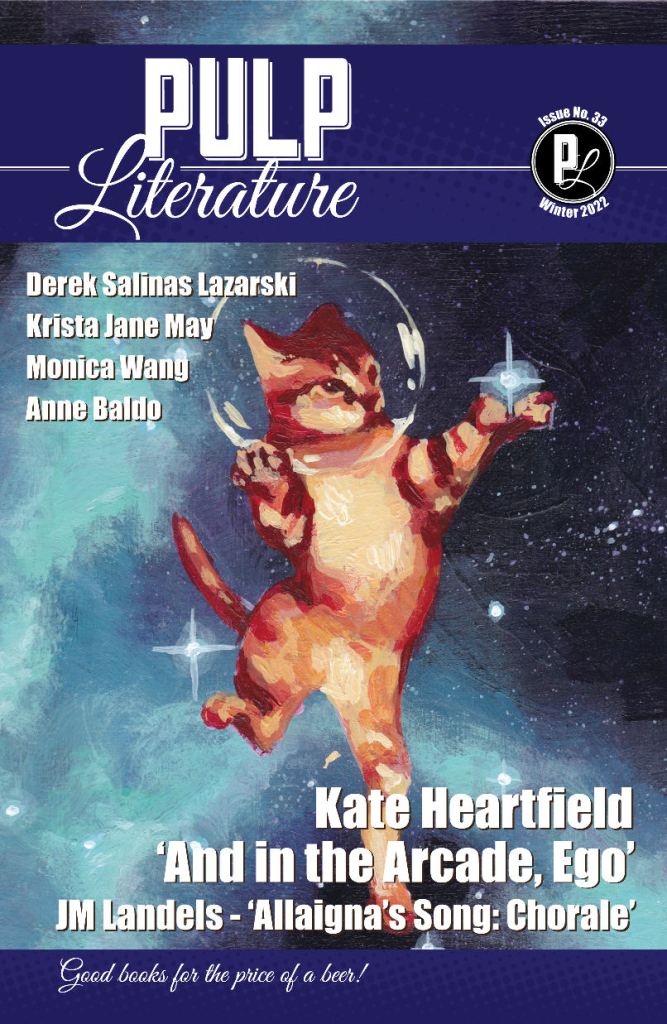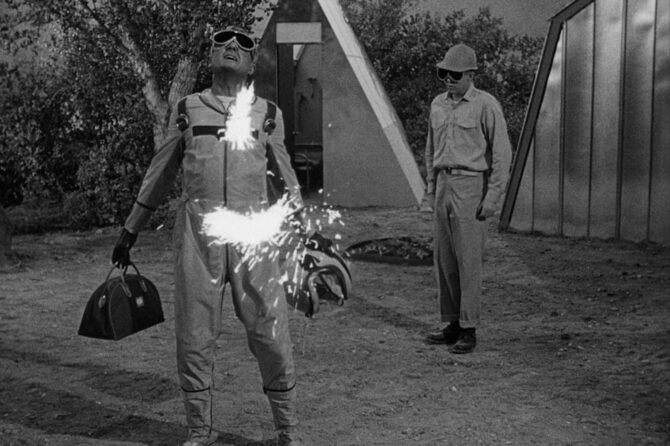
OBIR: Occasional Biased and Ignorant Reviews reflecting this reader’s opinion.

Pulp Literature Magazine #33 Winter 2022
Published by Pulp Literature Press, Langley, British Columbia, Canada, Winter 2022.
Managing Editor: Jennifer Landels, Senior Editor: Melanie Anastasiou, Acquisitions Editor: Genevieve Wynand, Poetry Editors: Daniel Cowper & Emily Osborne, Assistant Editors: Samantha Olson, Brooklyn Hook, Veronika Kos, & Melisa Gruger.
Cover art: Space Cat – by Bronwyn Schuster
And in the Arcade, Ego – by Kate Heartfield
Premise:
Tamara needs to win at Pinball so she can pay off her family’s debts.
Review:
How odd to write a futurist alternate history based on an archaic arcade game which I believe is no longer in fashion today, never mind the far future. To be sure, there are still arcades, and still pinball games, but I barely consider them popular culture today. More of a fringe fad somehow hanging on and in that sense similar to modern barber shop quartets and disco dancers. They still exist, but nobody is quite sure why.
But here’s the thing. A breath-takingly simple yet innovative concept plunges this hard SF tale into pure fantasy. In this version of the game, the player IS the pinball by virtue of riding a sort of padded bicycle bouncing off enormous bumpers inside a giant, hollow sphere aboard a space station. Each player can influence their flight to a minimalist extent sufficient to allow for tactics and even cheating. I leave aside questions of physics involving momentum, impact, and the frailty of the human body because those would defeat the premise. Not a story for the literal-minded. This is imaginative fantasy. The reader needs to go with the flow.
The two main characters are, to my mind, spoiled brats: one rich, one poor. To be fair, they live in a grim future, one in which a Christian Roman Empire has expanded to the stars while personal freedom is thoroughly limited by Cromwellian-like puritan fanaticism. Absolutely the girls are moral rebels and the authorities are out to get them. Hence their life is one long crime spree funding their ongoing effort to avoid the consequences of their actions. The girls have to win in order not to lose everything. High stakes indeed!
There is just enough background and characterization to give context and meaning to the game. Makes for an enjoyable romp.
Feature Interview – Pulp Literature interviews Kate Heartfield
Review:
Kate states “ I seem to write a lot about women and power, and the relationships between women, and that’s true of this story… unusual for me in that it explores a kind of theocracy, but what’s not unusual for me is the exploration of the individual in political change, and what defiance and compliance looks like.”
I accept that that holds true for all of her writing, which is particularly interesting because most of her work involves the past rather than the future. Case in point, her next novel The Embroidered Book, due this coming summer, a “what if?” novel based on Marie Antoinette and her sister discovering a book of magic spells when they were young. This holds myriad possibilities that may alter the course of the French Revolution in a delightful and intriguing manner. Sounds like a book worth reading!
Pretty Lies: Eyes Full of Moon – by Mel Anastasiou
Premise:
Jenny is still grieving for Joey, but her sorrow is complicated by the ghost of a woman wooing a mortal.
Review:
This is the second installment of a novel serialization begun in the previous issue. In these few chapters Jenny has settled down somewhat, in that she is now able to distinguish between reality and supernatural events without experiencing sanity-threatening confusion. On the other hand, she remains addicted to letting herself be drawn into the “reality” of these spiritual events , perhaps subconsciously hoping they will resolve her grief, but at the expense of her life being constantly at risk, never mind her sanity. Makes me wonder if the author is implying the desire to “find” a spiritual reality beyond our mundane life is fundamentally self-destructive in nature. The more I think about it, the more I believe this to be true.
A particularly interesting aspect of this ongoing story is the contrast between Jenny’s frequent hard-nosed objective give-and-take discussions with her sister Frances on whether or not ghosts are real or some kind of emotional metaphor in a damaged mind, and the matter-of-fact reality of the unreal whenever ghosts appear. In a sense It’s like reading a ghost story while simultaneously reading a learned treatise on modern superstition. You’d think this juxtaposition would rip the credibility of the story to shreds, but in fact each element supports the other in a smooth and seamless manner that results in a story possessing both intellectual and emotional appeal more-or-less in equal measure. Heck of a trick to pull off, but it works.
Despite the fact I don’t believe in ghosts and am not much interested in same unless humour is involved (I remain a big fan of Peter Jackson’s 1996 film The Frighteners), I confess Jenny’s struggle to remain sane enough to manage and control her reactions to irrational and terrifying experiences in a proactive, logical fashion strikes me as fascinating. Seems like something I’d attempt to do in similar circumstances, and this “bond” between us enables me to more readily identify with her character. Of course, I’m flattering myself. In truth, if confronted by the same phenomenon, I’d probably run in circles flapping my arms and gobbling like a turkey. Panic can take strange forms.
Point is, though most ghost stories are not my cup of tea, this one makes me want to read more. Definitely a very original approach. Well done.
Vessel (Poem) – by Cara Waterfall
Premise:
An abusive relationship from the victim’s point of view.
Review:
All about “the burden of living” in a subtle and insightful catalogue of emotional and desperate rationalizations. Depressing, but powerful, and in its detail, highly original.
Paper, Candles, Hearts, and Other Combustible Materials – by Anne Baldo
Premise:
Somebody set fire to the restaurant. His identity is known. The question is not who, but why.
Review:
If you define failure as life lived as well as possible but falling far short of expectations, this is a story about a failed marriage and a couple of love affairs doomed to failure. Or, to put it another way, a story about regret and the desire to start all over again. What do you do when you feel trapped by fate? How do your break out? There is no one answer. Everything depends on the nature of the individuals involved, and as they are each unique, the situation is too complicated to allow a simple solution.
It boils down to the life choice we all face. Do I accept what I’ve got even though it’s not exactly what I wanted but at least I’ve got it, or do I risk making life worse by choosing something radically different? A simple version: do I quit my job or not? More difficult: Do I change or stay the same? The story captures the fundamental indecision of day-to-day life. A choice is made, but not one I can recommend, even though it is implied it will work. The hard truth is we make our choices and live with the consequences. This story explores the essential conundrum of our lives. Strikes me as morbidly fascinating.
The Echo of Light Footsteps on Parchment – by Kimberley Aslett
Premise:
Meditations on a Parish Death Journal.
Review:
A short story, but rich in detail and imagination. Aslett takes the bare facts of a death register, so many young lives taken by a cholera epidemic, and conjures up the life of the dutiful man who kept the record and hints at his thoughts and emotions regarding the deceased people he had known. As history, pure speculation. But as fiction, an evocative recreation based on the barest of facts extrapolated into a kind of epic poetry, at least in feeling and imagery. Quite striking.
The Switch Fairy – by Monica Wang
Premise:
What do you do when a tiny fairy gets tangled in your yarn?
Review:
I must confess, on reading the title, my first thought was that the story would be about a dominatrix version of Tinker Bell, or some such. My ignorance regarding knitting technical terms partly responsible I suspect.
Though short, more of a vignette than a story, it’s a fairly complex look into the complications modern life would inflict on faerie folk, from the manner of their “birth” to the obstacles they face when flitting about. It is implied they come into being with a certain amount of knowledge in addition to instinct, so are as capable as newly hatched crocodiles or turtles in terms of seeking food, but alas, just as vulnerable. Makes me wonder if their life spans are as ephemeral as May flies. Maybe that’s why they’re so tiny, they never get a chance to reach adult stage. Be that as it may, a gentle, charming story.
Fate of Chickens – by Krista Jane May
Premise:
It’s late, it’s raining, and Lorena is drunk. Should she make a glorious spectacle of herself? Or go to bed?
Review:
This is another story about regret, and choice. Much depends on Lorena’s vivid memories of her unconventional friend Muriel who had so often attempted to get Lorena to burst the bonds of her inhibitions and limitations. Instead Lorena had chosen a life of safe restraint, now revealed to offer little in the way of rewards. From her vantage point on her unlit porch Lorena can see two older women, people she knows but cannot call friends, walking in the downpour so content with their lives they don’t even notice the weather. The sight of them inspires Lorena to what amounts to a drunken soliloquy.
Which is to say, an intense philosophical introspection enlivened with a surreal attention to tiny details of the scene before her intermingled with memories as detailed and in some respects even more surreal. Call it a drunk in search of an epiphany. I’ve had evenings like that, albeit long, long ago before I had figured out the meaning of life and learned to relax. Point is, I don’t dismiss this as merely a tour deforce of description and internal monologue. I recognise it as something familiar, something I can identify with. The desire to be free contrasted with fear of the consequences. I well understand the appeal and comfort of embracing one’s inhibitions and never giving oneself a chance to spread one’s wings, so to speak. I understand both Lorena’s regrets and her wishful dreams.
Or, at least, the emotion of them. The character’s nature, life experience and desires are different from mine and, no doubt, from those of many other readers. However, the problem under examination is universal, and I’m certain every reader will feel the impact of this story at some personal level, if only “there but for the grace of God go I.” Unless you are made of stone, you will be moved by this story.
Pale Pony Express – by Lulu Keating
Premise:
A little girl wants her mother to tell her how she was conceived.
Review:
An extremely short story so I don’t want to give away details as that would give away the story. Suffice to say it is a pleasingly complex account of one problem piled on top of another in a setting I am relatively unfamiliar with but enjoyed reading about. “So that’s what life in the Yukon entails” is one of my reactions. Another is being reminded “Life will find a way.” I’m not certain the little girl would want to run outside and tell her friends all about it, but I found the tale amusing. It puts me in mind of Stephen Leacock’s style of humour: dry and true to life.
CONCLUSION:
I had intended to devote two days to reading and reviewing this issue. However, Russia invaded the Ukraine. This awoke my dormant news-junkie addiction and I found myself dividing time between this writing task and live news coverage. I still have a bit of time to finish this review, but have run out of mental energy and am feeling exhausted and unable to think straight.
So, apologies to those contributors to this issue that I didn’t get around to reading and reviewing. I comfort myself with the thought that my primary aim is to convince you that Pulp Literature Magazine is well worth reading. As demonstrated in this issue, it typically contains stories that are well-written, thought-provoking, and unafraid to explore the darker and more puzzling of human attributes. To sum up, an intelligent, often beautiful, literary form of pulp fiction.
Check it out at: < pulp literature #33 >










